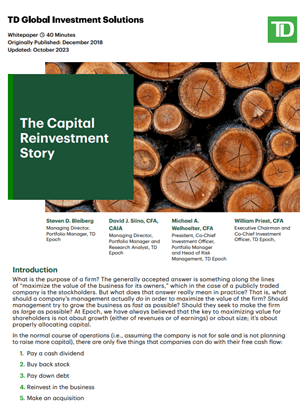William W. Priest, CFA, Executive Chairman, Co-Chief Investment Officer and Portfolio Manager, TD Epoch
Steven D. Bleiberg, Managing Director, Portfolio Manager
Michael A. Welhoelter, CFA, Managing Director, Chief Administrative Officer, Co-Chief Investment Officer, Portfolio Manager and Head of Risk Management
Introduction
What is the purpose of a firm? The generally accepted answer is something along the lines of “maximize the value of the business for its owners,” which in the case of a publicly traded company is the stockholders. But what does that answer really mean in practice? That is, what should a company’s management actually do in order to maximize the value of the firm? Should management try to grow the business as fast as possible? Should they seek to make the firm as large as possible? At Epoch, we have always believed that the key to maximizing value for shareholders is not about growth (either of revenues or of earnings) or about size; it’s about properly allocating capital.
In the normal course of operations (i.e., assuming the company is not for sale and is not planning to raise more capital), there are only five things that companies can do with their free cash flow:
1. Pay a cash dividend
2. Buy back stock
3. Pay down debt
4. Reinvest in the business
5. Make an acquisition
Download the full paper
